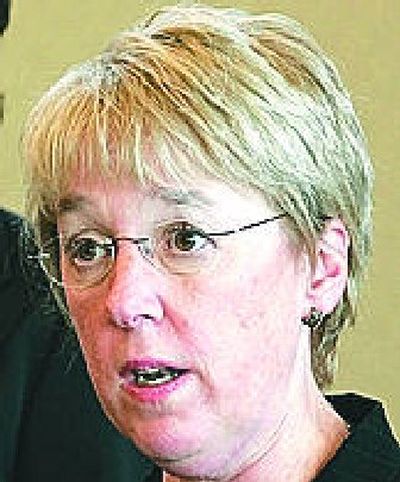Murray gets look at wind energy

HOPKINS RIDGE, Wash. – The three-bladed windmills that slice the air above the greening Palouse hills present a new crop for Columbia County farmers. They can mean as much as $1,000 a month, per wind turbine, when the wind is blowing and the electricity is flowing down the line to the Northwest’s power grid.
But there are limits to what a person can sow and reap in alternative energy. In the case of wind energy, one of the biggest limitations is not a shortage of land on which to plant the 200-foot-tall towers, but the shortage of capacity on the Bonneville Power Administration’s transmission lines.
Puget Sound Energy has 83 turbines spinning at Hopkins Ridge, a $200 million wind farm some 15 miles northeast of Dayton. They generate enough electricity to power about 50,000 homes.
But the utility could have put up even more towers, and generated more electricity, if there were capacity on the BPA lines, said Puget Sound Energy vice president Paul Wiegand.
On Monday afternoon, PSE invited Patty Murray, the state’s senior senator, out to the gusty hillsides with that message in mind. The utility wanted to show off the windmills, each of which is taller than a football field is long when one of the three blades reaches the top of its arc. They wanted to mention the economic impact of the construction and shipping the Danish-made windmills through the Port of Vancouver, and brag a bit about how the project came in ahead of schedule and under budget.
But mostly the utility wanted to do some lobbying. These projects won’t work if Congress doesn’t extend the Production Tax Credit, due to expire at the end of 2008, and they can’t reach their full potential unless BPA, a federal agency, builds more transmission lines, Wiegand and others said.
The lack of transmission capacity came up a few hours earlier – along with the war in Iraq, immigration policy and other alternative energy questions – when Murray sat down with some 20 local residents to talk about local concerns. Columbia County Commissioner Dwight Robanske estimated Hopkins Ridge and the nearby Marengo project for PacificCorp could have as many as 600 turbines, instead of about 200 now planned.
Congress does need to renew the tax credits so utilities can do some long-term planning on alternative energy, Murray said after touring the turbine farm.
“Transmission needs to be addressed. But it’s expensive,” she added. “We just haven’t focused BPA on transmission.”
At the earlier meeting in Dayton, Murray got a split view of the war in Iraq.
Owen Agenbroad, a retired agriculture researcher said he was worried that the United States could lose the Iraq war, just as it lost in Korea and Vietnam, because of political meddling.
“It bothers me that Congress feels they know more about running the war then generals on the battlefield,” Agenbroad, who served as a Marine on Iwo Jima, said. “You can blame it on Bush if you want, but it isn’t all his fault.”
Although Congress has passed spending bills that call for troop reductions, those still have differences that need to be worked out, and President Bush has threatened to veto them, Murray said. “So far, Congress hasn’t put any limits on the war.”
When retired farmer Jock Nysoe asked if Murray thought the recent increase in troops was working, she said she has her doubts.
“I’m not optimistic, although I’d like to be,” she said. “It’s very clear they’re in a civil war right now.”
Nysoe said later that he, too, is pessimistic about the chances for success in Iraq.
Other farmers asked for more help for alternative energy crops, such as soybeans that can be turned into biodiesel, by extending subsidies to fuel that is produced and consumed on a farm or incentives to use American-grown crops over foreign crops like palm oil.
They also said that new immigration policies have cut the number of farm workers to thin and harvest the state’s orchards. That’s a hidden cost, they said, because orchards that aren’t properly tended and harvested yield less, and farmers make less.
Immigration reform failed to pass last year, but Murray said she thought something will pass this year, and it will likely have guest worker provisions that a Senate bill offered but a House bill did not in 2006.